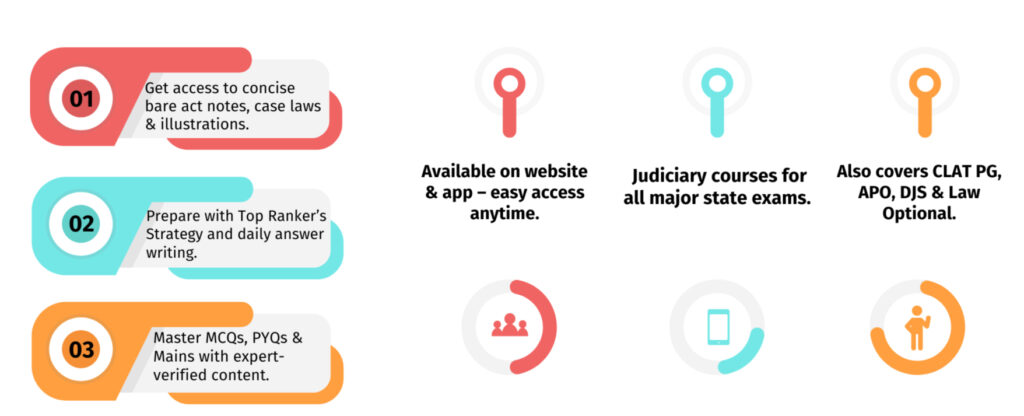The judiciary exam is one of the toughest and most competitive exams in India. Every year, thousands of aspirants work relentlessly to clear the examination and secure a position in the prestigious judiciary system. However, cracking it in the first attempt is a dream for many, and with the right strategy and preparation, it can be achieved.
This blog will walk you through a structured and practical approach to help you achieve success in the judiciary exam on your first attempt.
Key Steps to Crack Judiciary Exam in First Attempt

1. Understand the Syllabus Thoroughly
- Study the Detailed Syllabus: The first and foremost step is to have a clear understanding of the syllabus. The judiciary exam has a vast syllabus that includes subjects like Constitutional Law, Criminal Law, Civil Law, Indian Penal Code (IPC), Code of Civil Procedure (CPC), and Evidence Act, among others.
- Break the Syllabus Into Manageable Segments: Divide your syllabus into smaller, manageable sections. Focus on one section at a time and ensure that you don’t overwhelm yourself with multiple subjects at once.
2. Collect the Right Resources
- Standard Textbooks: Choose the best books recommended by judiciary toppers and experienced candidates. Some of the best books include:
- Ratanlal & Dhirajlal for IPC
- M. C. Jain for Criminal Law
- C.K. Takwani for Civil Procedure Code
- V.N. Shukla for Constitution Law
- Use Online Resources: Platforms like Edzorb Law provide comprehensive study material and guidance that can help streamline your preparation.
3. Develop a Structured Study Plan
- Time-Table: Create a daily and weekly time-table that includes time for each subject and regular breaks to keep yourself fresh.
- Mock Tests and Previous Year Papers: Mock tests are critical to gauge your performance and improve your exam-taking skills. Solve previous years’ papers to understand the exam pattern and frequently asked questions.
4. Time Management Is Key
- Prioritize Important Subjects: Focus on subjects that carry more weight in the exam and have a higher chance of being included in the questions.
- Balanced Approach: Make sure to devote equal time to both prelims and mains preparation. The mains require more in-depth knowledge and understanding of the topics.
5. Improve Writing Skills for Mains Exam
- Practice Writing: In the mains exam, writing skills are essential. Practice writing answers in a structured and concise manner. Use bullet points, headings, and sub-headings to make your answers more readable and impactful.
- Answer Writing Practice: Join a test series for answer writing or practice writing answers regularly to improve speed and accuracy.
6. Stay Updated with Current Affairs
- Current Affairs and Legal Developments: Keeping up with recent judgments, amendments to laws, and current events will help you answer questions in both prelims and mains.
- Use Law Journals and Newsletters: Subscribe to legal newsletters or follow prominent legal websites for up-to-date information on the judiciary system.
7. Revision and Consistency
- Revision Plan: Regular revision is the key to retaining what you’ve studied. Keep revising the topics you’ve already covered and consolidate your learning.
- Stay Consistent: Don’t let distractions hinder your preparation. Consistency is key to mastering all aspects of the syllabus.
8. Stay Calm and Focused During the Exam
- Manage Exam Stress: It’s important to stay calm and focused during the exam. Take deep breaths, keep positive thoughts, and approach each question logically.
- Last-Minute Preparation: In the final days before the exam, focus on revising key concepts and formulas rather than learning new things.
9. Importance of Mock Interviews and Personality Test
- Interview Preparation: After clearing the written exam, you’ll be called for the interview stage. Prepare thoroughly for the personal interview by understanding the type of questions asked and practicing answers for common legal questions.
Conclusion: Stay Focused and Persistent
Cracking the judiciary exam in the first attempt requires dedication, the right resources, a structured approach, and continuous effort. Stick to a disciplined routine, revise regularly, and practice as much as possible.
With the right approach, you can not only crack the judiciary exam but also make your mark as a successful judicial officer.
Key Points to Remember

- Understand the syllabus and choose the right books.
- Create a solid study plan and stick to it.
- Focus on regular practice and revision.
- Stay updated with legal news and current affairs.
- Maintain a calm mind and manage exam stress effectively.
For Expert Guidance and Resources: Edzorb Law
If you’re looking for expert guidance and top-quality study material, Edzorb Law is your perfect partner for judiciary exam preparation. They offer comprehensive courses, mock tests, and personalized guidance that can help you succeed in the judiciary exam on your first attempt.
Start your preparation today with Edzorb Law and take your first step towards success!

 Podcast
Podcast








 Features
Features






